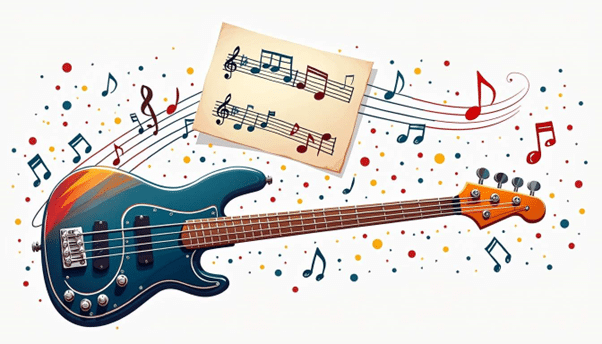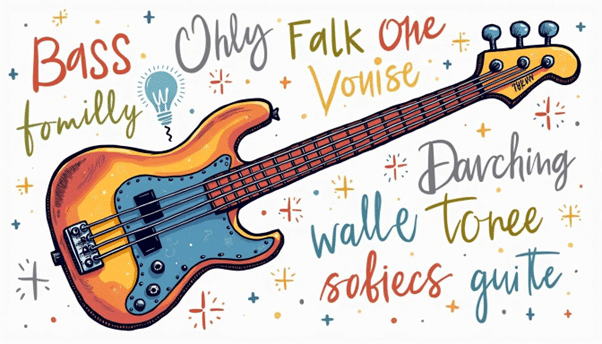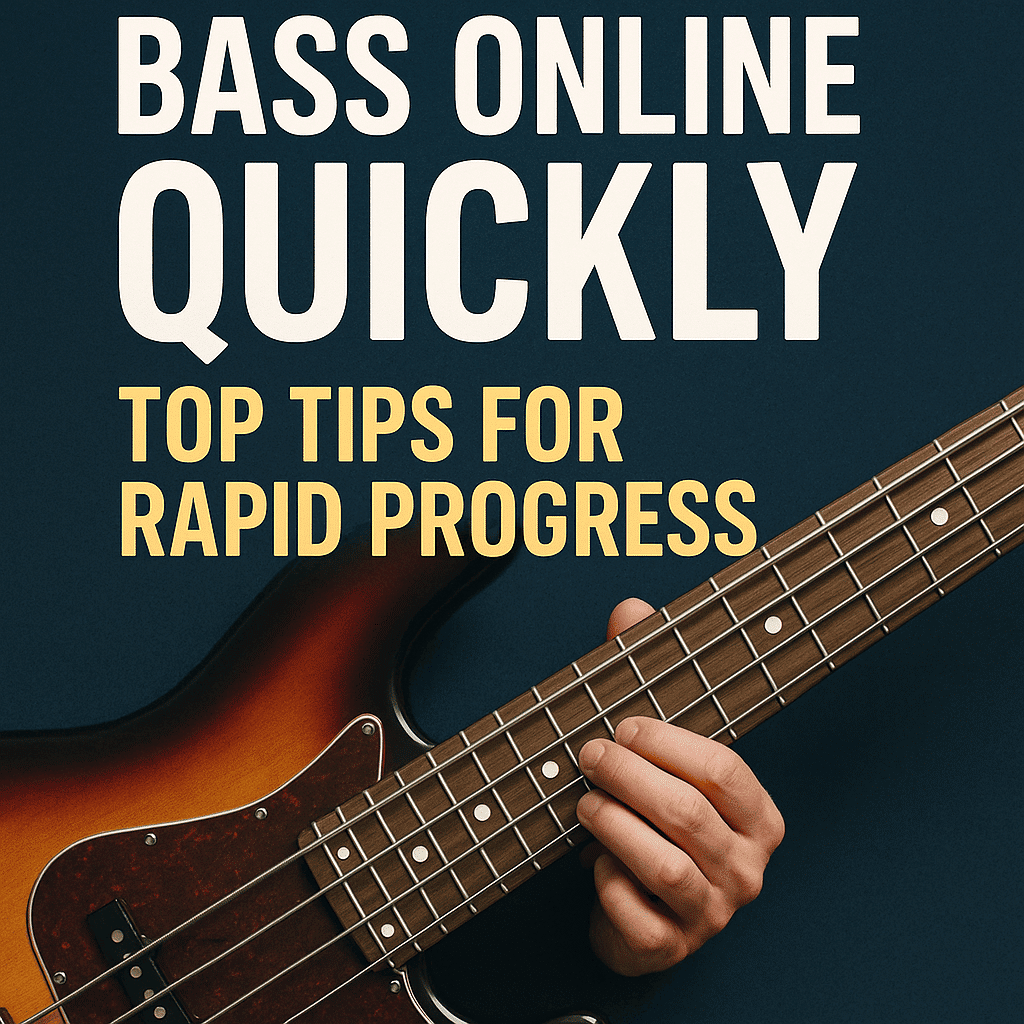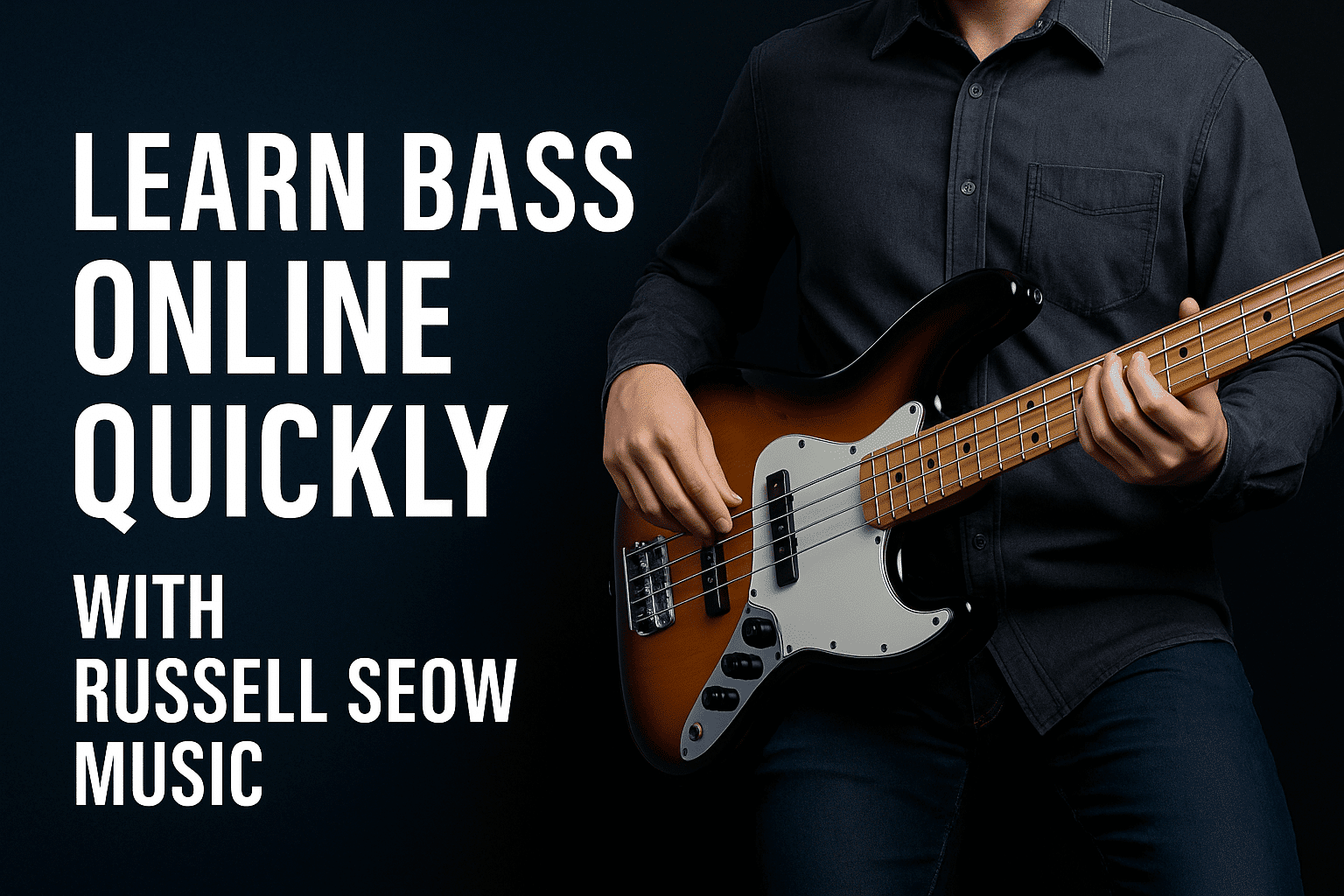Learning to play bass guitar can be an incredibly rewarding experience, providing a unique way to express yourself music. With the advent of online resources, aspiring basists can now use information and tutorial funds that make the learning process more efficient than before. Whether you are a complete beginner or looking to refine your skills, these tips will help you learn bass online quickly and effectively.
Understanding the Basics
Understand the basics Before diving into advanced techniques, it is important to establish a solid foundation. Understanding the original components of the bass guitar will set you to success.
Familiarize Yourself with the Instrument
Take time out to learn parts of the bass guitar, including the body, neck, wire and pickup. It will increase your game experience how each component affects the sound. Additionally, it is necessary to understand the layout of the freightboard. Familiarity yourself with notes on each string, as this knowledge will be invaluable as progress. The body shape of the bass guitar can also affect its tone; For example, a solid body usually produces more concentrated sounds, while hollow bodies can offer a warm, more resonant tone. Using with various bass can help you find the sound that resonates with your style.
Learn Basic Music Theory
A fundamental understanding of music theory can accelerate your learning process significantly. Basics, such as start with scales, cord and rhythm. Understanding how these elements interact will allow you to play with songs and improve more effectively. Resources such as online courses and resource music theory such as YouTube tutorials can provide a structured approach. Additionally, consider learning how to read sheet music and tableau, as this skill will open a huge array of songs and styles to find you. Attaching with music theory not only enhances your technical skills, but also deepens your praise for the music you love, allowing you to recognize patterns and structures in your favorite track.
Utilizing Online Resources
The Internet is full of resources that complete the bass players of all levels. The advantage of these devices can help you learn more efficiently.
Video Tutorials
Video tutorial is one of the most effective methods of learning a tool. Platforms like YouTube host countless channels dedicated to guitar lessons. Look for trainers who clearly explain concepts and provide practical exercises. Along with these videos, it can help strengthen your understanding and improve your technique. Many of these channels also provide plays as well as videos, which can be particularly beneficial for developing time and rhythm. By playing with a backing track, you can simulate a real band experience, allowing the practice to be more attractive and enjoyable.
Learn Bass the Right Way with Russell Seow
For those Basists who want to go beyond generic tutorials and actually mastered their equipment, Russell Sev offers a more concentrated, serial learning experience. With the years of professional performance and teaching under his belt, Russell breaks complex techniques in clear, achieved steps – whether you are beginning or refine your advanced skills. You will also benefit from their deep understanding of grooves, tones and music – nothing can repeat anything.
Book an individual bass session with Russell Seow today and start playing with confidence and clarity!
Speedy Songwriting for Bass Musicians- Tips and Techniques
Forums and Online Communities
Being engaged with online forums and communities can greatly increase your learning journey as a bass player. Websites such as Talkbass and Reddit’s bass guitar Subreddit are the treasures of the information where you can ask questions, share your progress, and get feedback from experienced players. These platforms often host various topics, including gear recommendations, technology tips and even music theory. Being part of a community can lead to insight from diverse approaches and encourage you to be motivated on your music path.Top of Form
Sheet Music and Tabs
Another invaluable resource sheet available online is the huge array of music and tableau. Websites such as Ultimate Guitar and Songster offer extensive libraries where you can find tabs for countless songs in various styles. This can be specially helpful to learn songs you love, because playing with your favorite track can increase your enjoyment and deepen your relationship for music. Additionally, many of these sites provide user-borne materials, allowing you to discover unique arrangements and interpretations that can inspire your own sports style.
Practice Strategies for Rapid Progress
Effective exercises are important for mastery in bass guitar. Applying strategic practice techniques can improve rapidly.
Set Clear Goals
The installation of specific, average goals will provide your practice session direction. Whether it is mastery in a particular song, improving your speed, or learning a new scale, you will be inspired and focused by having a clear purpose. Assess your progress regularly and adjust your goals as required.
Use a Metronome
A metronome is an essential tool to develop time and rhythm. Start by practicing the scales or simple referring in the tempo at a slow speed, increasing the speed by increasing the speed because you become more comfortable. This will help you create a concrete sense of time, which is important for any bassist.
Developing Technique
Good technique is fundamental to become a skilled basist. Focus on developing your skills through coherent practice and appropriate form.
Finger Placement and Hand Position
Proper finger placement and hand position can greatly affect your play. Make sure your fingers are curved and are correctly stationed on the freightboard. This will not only make it easier to play notes, but will also reduce the risk of injury. When practicing to develop muscle memory, check your posture and hand position regularly.
Practice Finger Exercises
Including finger exercise in the routine of your practice can increase your skill and strength. Simple practice, such as a scale or chromatic run, can help develop your finger freedom and coordination. To practice these exercises daily, gradually increase the complexity as you improve.
Playing Along with Songs
One of the most pleasant aspects of bass learning is playing with your favorite songs. This not only makes the practice more fun, but also helps you apply whatever you have learned in a real music context.

Choose the Right Songs
Select songs that are within your skill level to avoid frustration. Start with simple bass lines that are easy to follow. As you gain confidence, slowly challenge yourself with more complex pieces. Many online resources provide tabs and sheets for popular songs, making it easier to find tracks to suit your current capabilities.
Use Backing Tracks
Playing with a backing track can greatly increase your time and drain. Websites and apps provide a variety of banking tracks in various styles. This exercise will help you develop your ability to lock your overall music with a band.
Engaging with the Community
Connecting with other musicians can provide valuable insight and help in your learning journey.
Join Online Forums and Groups
Participation of online forums or social media groups dedicated to bass players can be incredibly beneficial. These platforms allow you to ask questions, share experiences and receive response from fellow musicians. Connecting with a community can also cause motivation and accountability.
Collaborate with Other Musicians
Consider cooperating with other musicians, whether online or in individual. Jams with others can expose you to new styles and techniques, which can enhance your learning experience. Additionally, playing with other musicians can help you develop your ears and improve your improving skills.
Keep an eye on your progress
To maintain inspiration and identify areas for improvement, it is necessary to monitor your progress.
Record Yourself
Recording your practice sessions can give valuable response. Listening to your recording will help you identify areas where you excel and areas that require work. This practice can also increase your confidence because you hear your progress over time.
Keep a Practice Journal
Maintaining a practice magazine can help you to be organized and focused. Documentation of your goals, practice routine and any challenge you have to face. Consider your progress regularly will provide insight into your development and will help you to be inspired.
Exploring Different Styles
As you become more comfortable with bass, searching various music styles can make your skills wider and your practice sessions can be made attractive.
Experiment with Genres
Do not limit yourself to a style. Using with various styles, such as jazz, rock, funk, or blues, can increase your versatility as a bassist. Each style has its own unique technique and rhythm, which provides a rich learning experience.
Learn Different Playing Techniques
Include various sports techniques in the routine of your practice, such as slap bass, fingerstyle, or pick playing. Each technique provides a different sound and can expand your music vocabulary. Online tutorials can guide you through these techniques, allowing you to find new ways to express yourself on the device.
Staying Motivated
Learning a tool can be challenging, and maintaining inspiration is important for long -term success.

Celebrate Small Achievements
Identifying and celebrating small milestones can promote your inspiration. Whether he is mastery in a difficult song or improving his speed, take time to accept his progress. This positive reinforcement will encourage you to advance.
Set Up a Reward System
Set- Up a reward system for yourself. After reaching a specific goal or completing a challenging practice session, behave something pleasantly. This can be as simple as watching your favorite show or taking a break to indulge in a favorite snack. Adding awards with achievements can increase your inspiration.
Final Thought
Bass learning online is quickly obtained with the right approach and resources. Understanding the basics, using the online tool, and by applying effective practice strategies, aspirational bassists can make significant progress in a short time. To engage with the community, searching various styles, and being motivated are also the major components of a successful learning journey.
With dedication and perseverance, one can mastered the bass guitar and enjoy countless opportunities that provide for the expression of music.
Frequently Asked Questions (FAQs)
1. What essentials should I learn before starting online bass lessons?
Before diving in, get familiar with your bass guitar—know the parts, how to hold it, and how the fretboard works. Also, understanding simple music concepts like rhythm and scales will give you a strong foundation.
2. How can I find quality online bass guitar tutorials?
Look for step-by-step tutorials on YouTube or trusted websites that explain both techniques and theory. Channels that let you play along with songs or backing tracks are especially helpful for practice.
3. What’s the most effective way to practice bass online?
Practice smart—set goals, warm up with finger exercises, use a metronome to stay in time, and try playing along with your favorite songs. Consistent, focused practice beats long, random sessions.
4. How do I use a metronome to improve timing?
Start slow! Use a metronome to keep a steady beat while you play. It helps train your sense of timing, which is super important for bass. Gradually increase the tempo as you improve.
5. Why is music theory important for learning bass?
Music theory helps you understand why you’re playing certain notes. It makes it easier to create basslines, play along with others, and unlock the fretboard more confidently.
6. Can beginners learn bass effectively online, or do they need in-person lessons?
Absolutely, beginners can learn online with the right resources! While in-person lessons offer feedback, online learning gives you flexibility, tons of material, and self-paced progress.
7. How soon will I see progress with consistent online learning?
If you practice regularly—even just 20–30 minutes a day—you can start playing simple songs in a few weeks. With dedication, your skills will noticeably grow within 2–3 months.
8. What online communities are helpful for bass learners?
Check out places like TalkBass, Reddit’s r/BassGuitar, or Facebook bass groups. They’re great for asking questions, sharing your progress, and learning from other bass players.
9. Which are the best tools and resources for learning bass online?
You can learn a lot from free YouTube channels, tab sites like Ultimate Guitar or Songsterr, and apps like Fender Play or Yousician. Don’t forget a metronome app to keep your timing sharp!
10. How can I keep practice engaging and stay motivated?
Mix things up—learn your favorite songs, set small goals, try online challenges, or record your progress. Celebrate your wins, even the small ones, and you’ll stay inspired to keep playing.





